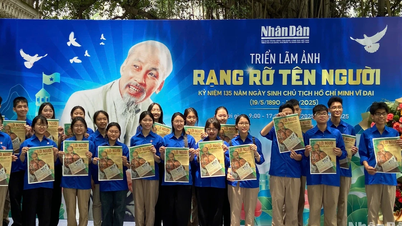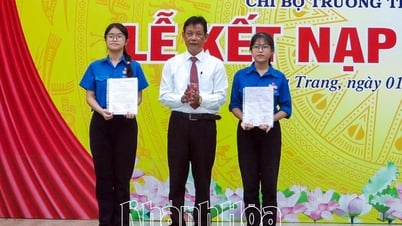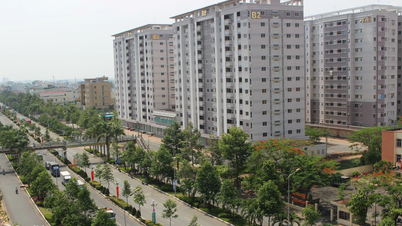Within the framework of the VITM 2025 International Tourism Fair, on April 11, the forum “Developing green destinations, elevating Vietnam tourism” took place in Hanoi. With the participation of many managers and leading experts, the event is a place to share experiences, spread awareness and promote practical actions for the green transformation of the tourism industry.
A major step towards green transition
Vietnam, as a member state of the United Nations, has committed to implementing 17 Sustainable Development Goals (SDGs). These commitments include goals directly related to environmental protection, climate change response, and sustainable tourism development.
At the COP26 Conference in 2021, our country also committed to achieving net zero emissions by 2050. These strong actions have required Vietnam to make a green transition in all sectors, including tourism.
Looking back to 2024, according to Deputy Representative of the United Nations Development Programme (UNDP) in Vietnam Patrick Haverman, Vietnam's tourism industry has truly become a strong economic driver, welcoming more than 17.5 million international visitors and 110 million domestic visitors.
Tourism revenue reached an impressive figure of VND840 trillion. This dynamic recovery and transformation shows the industry's growth potential.
“Viet Nam has taken an important step forward in focusing on the realisation of green destinations across the country. The focus of this growth is not just on quantity but also on ensuring that the entire tourism sector is green, sustainable, environmentally friendly and beneficial to all,” said Patrick Haverman, Deputy Representative of UNDP in Viet Nam.
Accordingly, the positive impacts from the tourism industry have spread widely, creating many new job opportunities, boosting the local economy and bringing vitality to business communities and people across the country.
 |
Scene of the forum "Developing green destinations, elevating Vietnam tourism". |
“However, the vision of developing green destinations is not limited to conservation efforts in marine and ecological areas, we also recognize the important role of green transportation. Encouraging visitors to prioritize environmentally friendly travel options not only deepens their experience but also directly contributes to keeping the air cleaner,” said Mr. Patrick Haverman.
Recently, the United Nations Development Program has coordinated with localities to launch the "Check-in and Share Green Transport" station. The above project has been piloted in Tuy Hoa ( Phu Yen ) and Hon Yen (Hue City). This is a specific step of UNDP in realizing this orientation.
By promoting green transport sharing models and raising public awareness, organizations, businesses and localities are joining hands to gradually create the foundation for a truly sustainable green tourism ecosystem.
Vietnam has taken a significant step forward in its focus on realising green destinations across the country. The focus of this growth is not just on quantity but also on ensuring that the entire tourism sector is green, sustainable, environmentally friendly and beneficial to all.
Deputy Representative of UNDP in Vietnam Patrick Haverman
Sharing the same viewpoint on the need to develop green transportation, Director of the Institute of Tourism Economics Nguyen Van Dinh commented: Developing green transportation is one of the necessary transformation trends for the tourism industry today. Localities and travel businesses need to increase the provision of sustainable means of transportation at destinations such as bicycles, electric cars, or encourage the use of public transportation.
“In Bali, Indonesia, the electric bus system has helped reduce carbon emissions. Or in Germany, the 'Rail & Fly' program encourages tourists to travel by train instead of plane to reduce emissions. The trend of slow travel will become more and more popular,” Mr. Dinh added about countries that have successfully implemented this model.
Constantly striving to overcome challenges
According to Mr. Pham Ha, Chairman of LuxGroup, the green tourism path also faces many challenges. Among them, investing in energy-saving equipment, waste treatment, environmentally friendly materials, etc. requires high costs and a long payback period.
Convincing partners - especially in remote areas - to commit to green action remains a difficult problem that needs to be solved through dialogue, training and technical support.
Meanwhile, green tourism products are difficult to compete due to high costs, making it difficult for sustainable tourism products to reach the mass market, requiring a clear value positioning and communication strategy.
In Vietnam, green businesses do not enjoy specific incentives in terms of tax, credit, product bidding or market access, especially for small and medium enterprises, which may make many businesses reluctant to switch to green tourism.
From the actual operation of the enterprise, Mr. Pham Ha believes that there are 3 important factors, which are strategic thinking from the leadership - putting sustainability as the core factor; establishing a supply chain to accompany green tourism - selecting and accompanying partners and suppliers who share the same commitment to sustainable goals and actions; educating the market - raising awareness of customers, partners, suppliers, communities and internal staff about the long-term benefits of responsible tourism.
 |
| LuxGroup plants trees for carbon emission compensation project in Vang Ngan village, Suoi Quyen commune, Yen Bai. |
Accompanying businesses and localities in promoting the development of green tourism and green destinations, for many years, the Vietnam Tourism Association has organized many activities and events to promote green transformation in tourism.
In particular, the project "Reducing plastic waste in Vietnam's tourism sector" has promoted activities to reduce plastic waste in the tourism sector, contributing to environmental protection and tourism development, aiming to achieve the sustainable development goals of the tourism industry, contributing to the goal of sustainable economic development of the country.
The pilot process of applying solutions and initiatives to reduce plastic waste for 3 months at 60 tourist areas and spots in Ninh Binh and Quang Nam showed that the amount of plastic waste has decreased by an average of 35%.
In Ninh Binh, comparing the total volume of plastic waste generated before and after the pilot, it shows that the total volume of plastic waste generated after the pilot decreased by 14-23% compared to before the pilot in all types of businesses (hotels 23%, restaurants 14%, travel agencies 14%, tourist attractions 20%).
In Hoi An, the amount of plastic waste generated decreased by 64% at hotels during the pilot program.
According to Mr. Vu Quoc Tri, General Secretary of Vietnam Tourism Association, in order to promote the development of green tourism and green destinations, Vietnam Tourism Association has developed and issued a set of green tourism criteria.
The set of criteria guides tourism service businesses and tourist destinations to voluntarily participate in practicing green tourism. Initially, it applies to tourist destinations, accommodation establishments, travel agencies and tourist service businesses (food, entertainment, shopping).
Vietnam Tourism Association informed that by 2025, 75% of the association's member units will be raised awareness of the harmful effects of plastic waste and the importance of reducing plastic waste; 50% of the Vietnam Tourism Association's member units will issue guidelines/plans to reduce plastic waste or integrate the content of reducing plastic waste into their regulations/operation plans.
By 2030, 100% of Vietnam Tourism Association members will not use non-biodegradable plastic bags and disposable plastic products; 100% of Vietnam Tourism Association member units will issue guidelines/plans to reduce plastic waste or integrate plastic waste reduction content into operational regulations/plans.
Source: https://nhandan.vn/du-lich-viet-nam-chuyen-doi-xanh-de-phat-trien-ben-vung-post871701.html


![[Photo] Party and State leaders attend the special art program "You are Ho Chi Minh"](https://vphoto.vietnam.vn/thumb/1200x675/vietnam/resource/IMAGE/2025/5/18/6895913f94fd4c51aa4564ab14c3f250)

![[Photo] Ready for the top competitions of Vietnamese table tennis](https://vphoto.vietnam.vn/thumb/1200x675/vietnam/resource/IMAGE/2025/5/18/9c547c497c5a4ade8f98c8e7d44f5a41)


![[Photo] Many young people patiently lined up under the hot sun to receive a special supplement from Nhan Dan Newspaper.](https://vphoto.vietnam.vn/thumb/1200x675/vietnam/resource/IMAGE/2025/5/18/6f19d322f9364f0ebb6fbfe9377842d3)













![[Photo] Party and State leaders attend the special art program "You are Ho Chi Minh"](https://vphoto.vietnam.vn/thumb/402x226/vietnam/resource/IMAGE/2025/5/18/6895913f94fd4c51aa4564ab14c3f250)
![[Photo] Walking on the royal poinciana flower road in the West](https://vphoto.vietnam.vn/thumb/402x226/vietnam/resource/IMAGE/2025/5/18/f9335355d0744d1593f7e36bc4c7f4b7)


![[Infographic] Achievements of Vietnamese students at the 2025 International Science and Engineering Fair](https://vphoto.vietnam.vn/thumb/402x226/vietnam/resource/IMAGE/2025/5/18/67c3dbcf40744d06bf8164f789fcdc5c)

































































Comment (0)